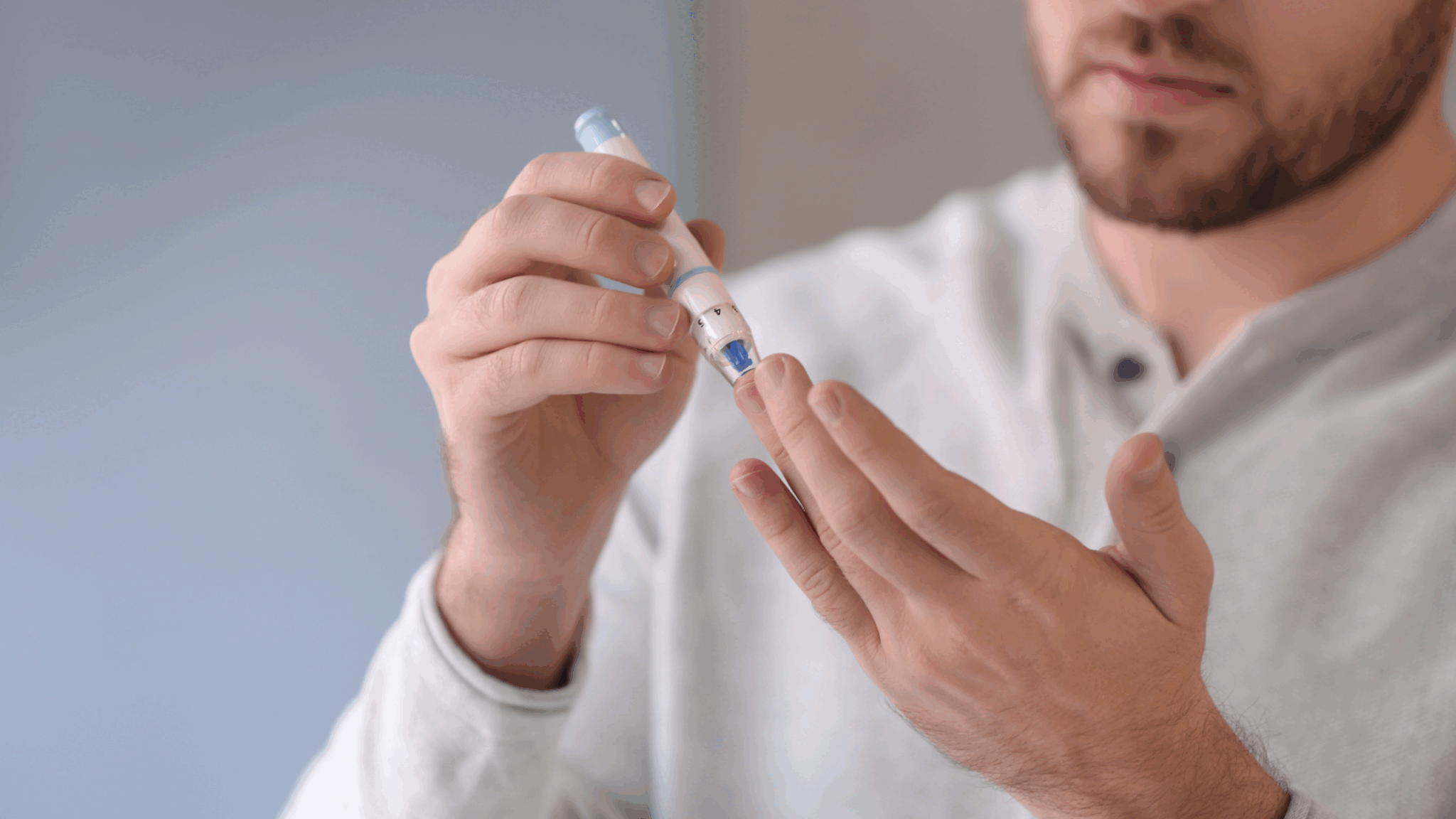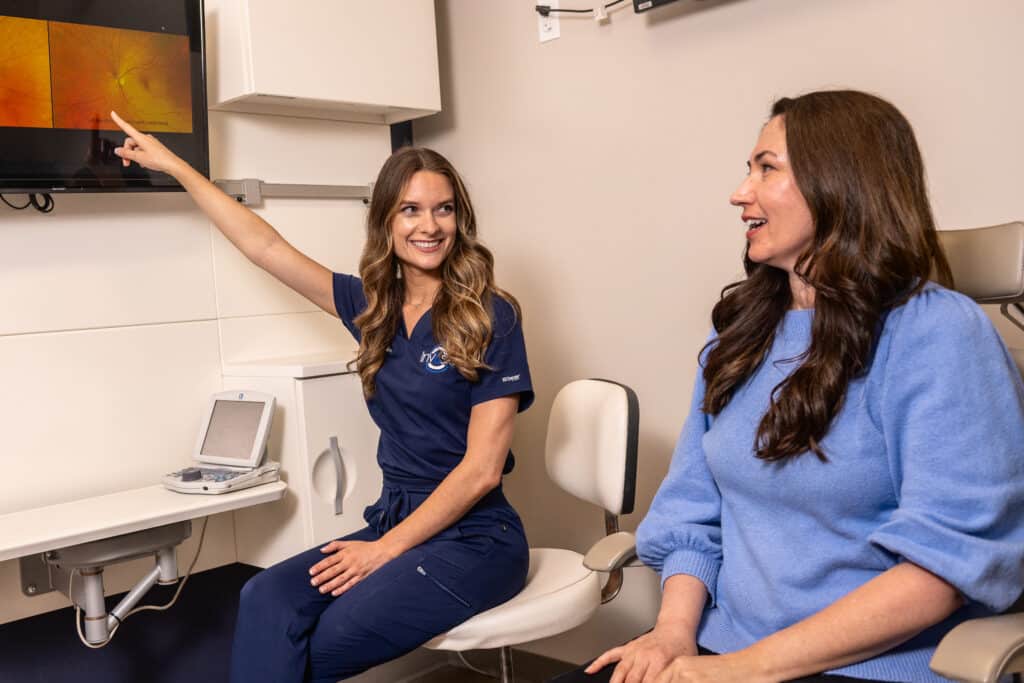Diabetes and Your Eyes: What You Should Know
Posted by: Invision Optometry in Category Diabetic Eye Care, Eye Health

Diabetes affects more than just your blood sugar, it can also impact your vision. In fact, it’s one of the leading causes of preventable blindness in adults. The good news? With regular eye exams, early detection, and proper management, you can protect your sight and keep your eyes healthy for years to come.
The Connection Between Diabetes and Eye Health
When blood sugar levels remain high for long periods, it can damage the tiny blood vessels in your retina, the part of your eye that senses light. Over time, this damage can lead to diabetic retinopathy, a serious eye disease that can cause vision loss if left untreated.
Diabetic retinopathy occurs when high blood sugar causes changes in the retinal blood vessels. Some vessels may swell and leak fluid, while others may close off or grow abnormally. Over time, it can cause swelling in the retina and cloudy or blurred vision.
This condition usually affects both eyes, and the longer someone has diabetes, the higher their risk. Anyone with type 1 or type 2 diabetes can develop diabetic retinopathy, especially if blood sugar is not well controlled.
People with diabetes are also at higher risk for:
- Diabetic Macular Edema – Swelling in the central part of the retina, leading to blurry or distorted vision
- Cataracts – Clouding of the eye’s lens that develops earlier in people with diabetes
- Glaucoma – Increased eye pressure that can damage the optic nerve

Real-Life Impact: How Diabetes Affects Vision
Take, for example, Maria, a teacher who was diagnosed with type 2 diabetes in her 40s. She skipped her eye exams for a few years because her vision “felt fine.” When she finally went in, her eye doctor found early signs of diabetic retinopathy. Luckily, with treatment and better blood sugar control, her vision was preserved.
Or consider James, an avid cyclist with type 1 diabetes. His consistent routine of yearly eye exams helped his doctor spot small retinal changes before they became serious, allowing for quick treatment and no disruption to his active lifestyle.
Stories like these remind us that eye exams for people with diabetes aren’t just about seeing clearly today, they’re about protecting your vision for the future.

Early Signs of Diabetic Retinopathy
Between 40 and 45 percent of Americans with diabetes have some stage of diabetic retinopathy, but only half are aware of it. Early symptoms are often subtle, but as it progresses, you might notice:
- Blurry or fluctuating vision
- Difficulty seeing at night
- Dark or empty areas in your vision
- Spots or floaters that appear suddenly
As these symptoms progress, they can start to interfere with everyday activities like reading, driving, or recognizing faces. The good news is that with a few healthy habits and consistent care, you can protect your vision and help slow these changes over time.

How to Prevent or Slow Diabetic Eye Disease
Take charge of your eye health with a few simple habits:
- Keep your blood sugar, blood pressure, and cholesterol in check. These are key factors in reducing eye complications.
- Eat a balanced diet rich in leafy greens, fish, and whole grains.
- Quit smoking, if you smoke it worsens blood vessel damage and increases your visit for macular degeneration.
- Exercise regularly to improve circulation and maintain healthy blood sugar levels.
- Schedule annual eye exams even if your vision feels normal.
From managing your blood sugar with the help of your primary care doctor, to staying active and eating well, these everyday choices add up, supporting your eye health and helping you continue to see the moments that matter most.
Treatment Options for Diabetic Retinopathy
While prevention is powerful, it’s important to understand that treatments exist if diabetic retinopathy begins to affect your vision. While there is no cure, there are ways to prevent or slow vision loss:
- Anti-VEGF Injections – Reduces swelling and prevents new blood vessel growth
- Laser Treatments – Seals leaking blood vessels
- Vitrectomy Surgery – In advanced cases it removes blood or scar tissue
The right treatment depends on how advanced the disease is, but early detection can make a big difference in preserving your eyesight. If needed, our eye doctors will refer you to an expert ophthalmologist for specialized care.

Why Annual Eye Exams Matter
If you have diabetes, annual comprehensive eye exams aren’t optional, they’re essential. Diabetic eye diseases can develop long before you notice symptoms, and by the time vision changes occur, damage may already be significant.
Regular eye exams allow your eye doctor to:
- Catch early warning signs before vision loss occurs
- Track subtle changes over time
- Create a personalized plan to protect your sight
Simply put, annual eye exams are one of the most important ways to stay ahead of diabetes-related vision problems and keep your eyes healthy for the long term.
Caring For Your Eyes Starts Here
Your eyes tell the story of your overall health, and with diabetes, that story deserves extra care. If it’s been more than a year since your last eye exam or if you’ve noticed any vision changes, now’s the time to schedule one. Our caring team at Invision Optometry is here to help you manage your diabetes and keep your eyes healthy.
📞 Call us today at 619.222.2020 to book your comprehensive eye exam and take the next step toward protecting your vision and overall wellness.


